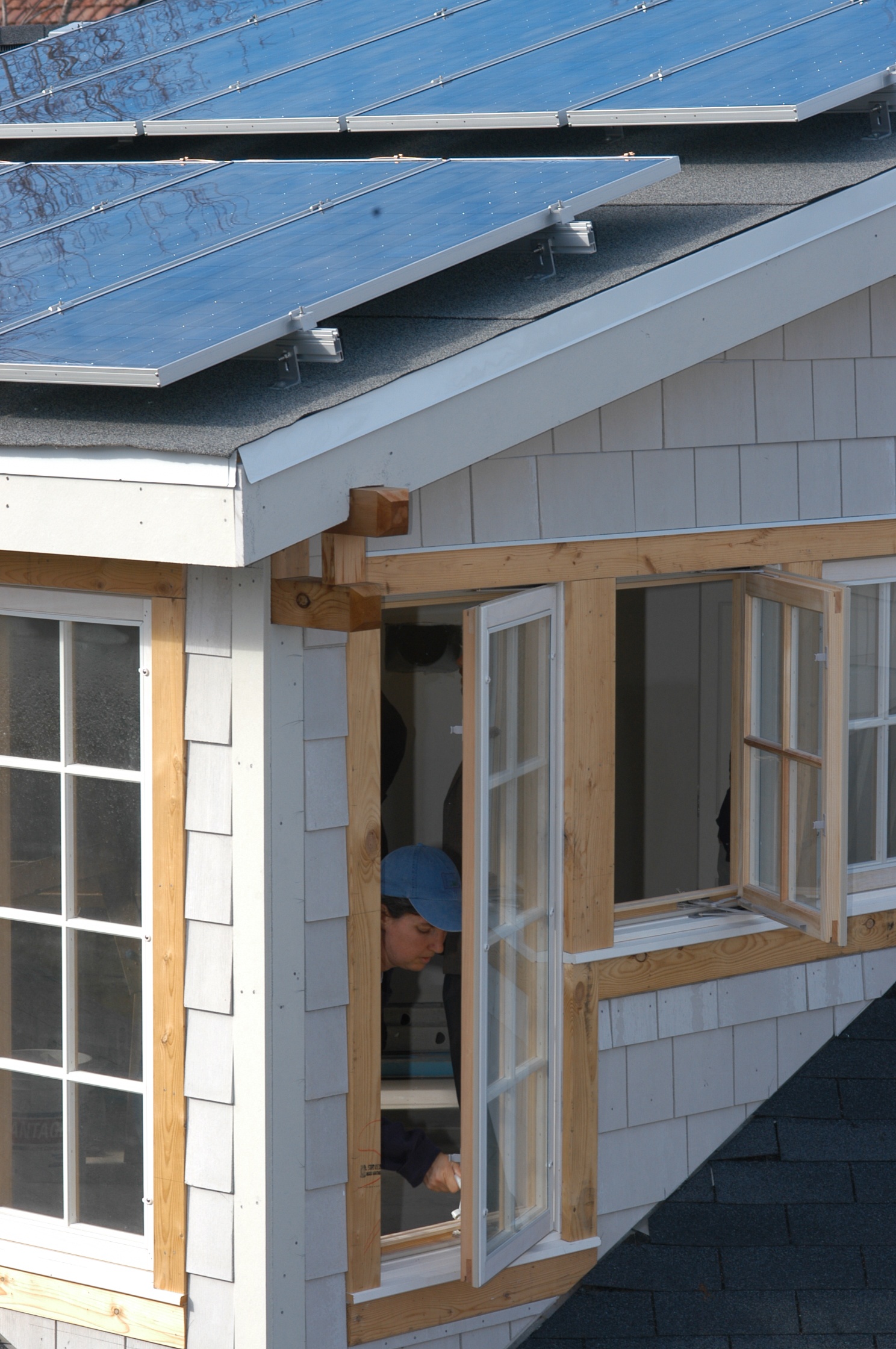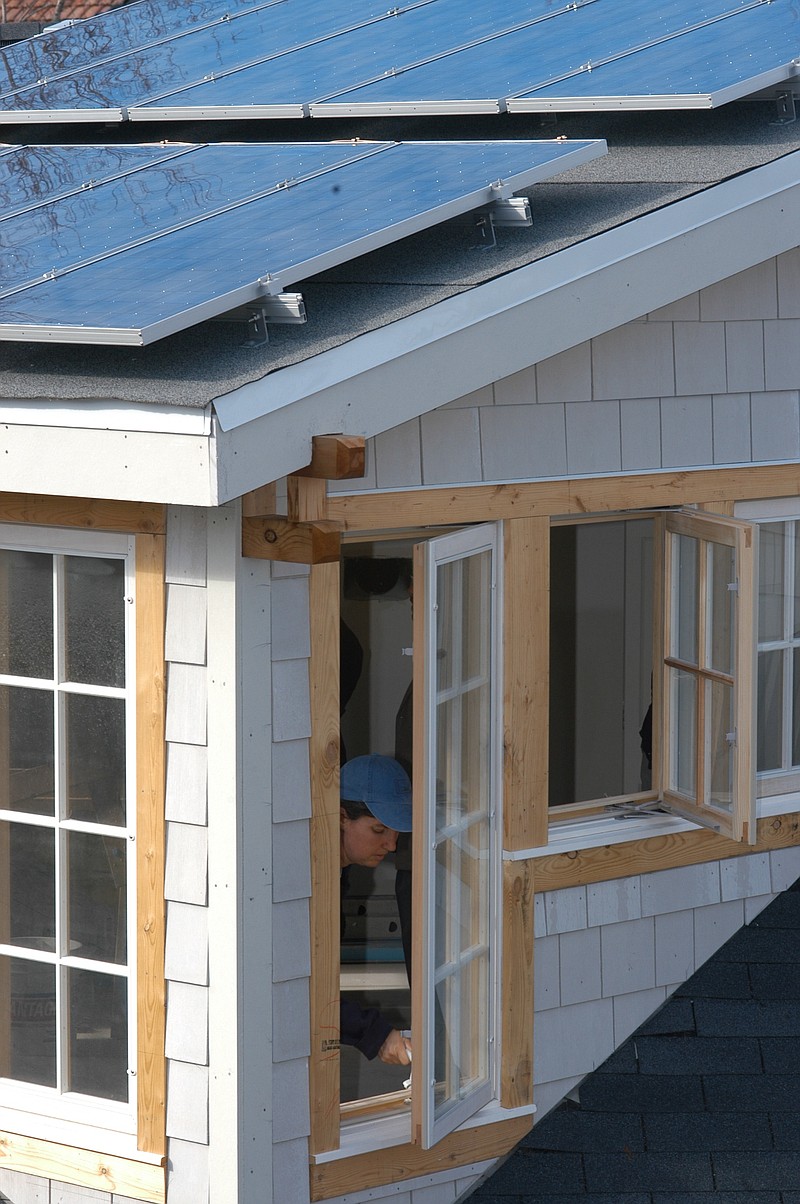 Jenifer Genovesi closes the windows of the second story of the Genovesi's house which is adorned with newly installed solar panels. The panels collect solar energy which is then sold back to Electric Power Board. EPB pays the Genovesi household 15 cents per kilowatthour, and as of Jan. 15, 2005 the panels have produced 108 kilowatthours since Christmas eve of 2004 when the meter was activated.
Jenifer Genovesi closes the windows of the second story of the Genovesi's house which is adorned with newly installed solar panels. The panels collect solar energy which is then sold back to Electric Power Board. EPB pays the Genovesi household 15 cents per kilowatthour, and as of Jan. 15, 2005 the panels have produced 108 kilowatthours since Christmas eve of 2004 when the meter was activated.The Tennessee Valley Authority, which has cut the premiums it pays for small-scale solar power in each of the past four years, could again trim what it pays customers who generate electricity from the sun next year based upon a new assessment of the value of solar power.
TVA on Tuesday released a 32-page analysis of solar power and distributed energy that concludes that the overall value of solar power is 40 percent less than what TVA has been paying some solar producers. TVA's first-of-its-kind analysis of the costs and benefits of solar power generated by residential and commercial customers found that the average value of solar generation for TVA to be 7.2 cents per kilowatt hour, which is far below the current average of about 12 cents per kwh TVA pays based upon a 2-cent-per-kilowatt hour premium paid above TVA's average retail rate of about 10 cents per kwh.
"The calculated value for solar PV small systems, which represents the solar-specific avoided cost to TVA, is below the current average retail rate in the TVA service territory (about 10 cents per kwh) and is less than the solar rate currently being offered by TVA (a 2-cent-per kwh paid above the retail rate)," the study concludes.
TVA cautioned that the estimate "is not intended to imply" that the incentives will be altered to match the calculated value. TVA spokesman Scott Fieder said the report is a starting point for further analysis and could inform TVA's pending decision on what, if any, incentives TVA will offer for small-scale solar power in 2016.
The current solar payments, equal to 12 cents per kwh, are down from 14 cents in 2014, 19 cents in 2013 and 22 cents per kwh in 2012.
Solar power backers insist that TVA's analysis did not do enough to consider the environmental and health benefits for solar power, which does not emit greenhouse gases linked with global warming or smog effluents that cause many respiratory diseases.
"This study was an important first step, but we don't think it adequately reflects the health benefits from solar power, which replaces more harmful coal or natural gas power generation," said Amanda Garcia, a staff attorney for the Southern Environmental Law Center who served on one of the stakeholder groups that reviewed the study.
Solar power of up to 50 kilowatts generated on rooftops is beneficial to TVA because it is scalable, versatile and eliminates fuel costs and many harmful emissions, according to the study. But the analysis also found that solar power presents challenges for TVA because of its intermittent generation and the inability for TVA to dispatch or control the power, given the variability of the sun and the freedom of individual generators to produce the power when they want.
Steve Johnson, president of the state's biggest solar installer, Lightwave Solar in Nashville, said the solar industry can survive with lower premiums but TVA should improve the way it signs up producers and the ending date each year for new projects.
TVA is cutting off projects for 2015 on Nov. 18 and the first six weeks of each new year are designed to allow applications to come to TVA so the utility can sort through whether there is too much demand and needs to be a lottery to allocate the 10 megawatts set aside for small-scale solar.
"We need a year-round program that works better for solar producers than what TVA now has," said Johnson, who also serves as vice president of TenneSEIA, the state chapter for the Solar Energy Institute of America. "It's hard to run your business only eight months a year which is what TVA has left us with."
Georgia currently pays 13 cents per kwh for solar and North Carolina provides a generous state income tax credit which has helped push solar generation in the Tar heel state to second in the nation behind only California.
'"TVA as a public power utility with a mandate for economic development and environmental stewardship should be a leader in renewable energy, not a laggard behind neighboring states like Georgia and North Carolina," Garcia said.
But during public hearings on renewable energy, industrial customers and some TVA distributors have urged TVA to pursue the least cost source of power to keep its electric rates as low and competitive as possible.
TVA is yet to announce what, if any incentives, it will offer for solar generation next year. "Stay tuned," TVA President Bill Johnson told reporters following the last TVA board meeting in August.
Solar power producers do qualify for a 30 percent federal tax credit through at least 2016, Johnson said.
Contact Dave Flessner at dflessner@timesfreepress.com or at 757-6340.
